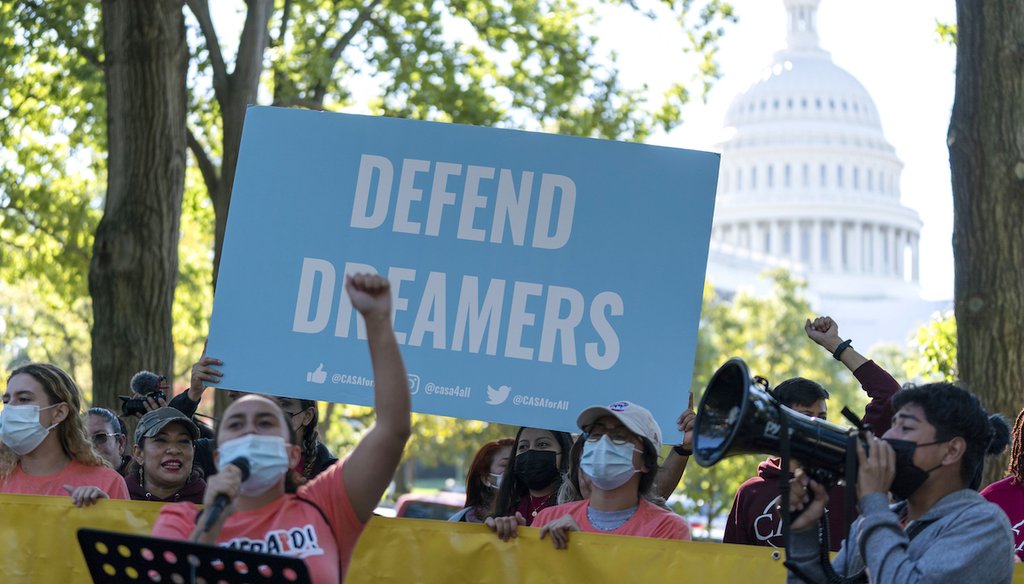Stand up for the facts!
Our only agenda is to publish the truth so you can be an informed participant in democracy.
We need your help.
I would like to contribute

People rally outside the Capitol in support of the Deferred Action for Childhood Arrivals (DACA), during a demonstration on Capitol Hill Oct. 6, 2022. (AP)
If Your Time is short
-
In 2018, Rubio voted against two proposals that included a pathway to citizenship for DACA recipients. But he supported a different bill that also provided a pathway to citizenship for beneficiaries.
-
The bills’ main differences were on border security and limits to legal immigration.
-
Rubio criticized the deferred action policy from the start, but has wavered on whether the program should end before or after Congress passes a permanent solution for the program’s beneficiaries.
On Facebook, a Spanish-language ad features a Venezuelan woman calling Sen. Marco Rubio, R-Fla., a "hypocrite."
The woman claims that Rubio, who is running for re-election, took "away opportunities from Dreamers," a term broadly used to describe immigrants brought to the U.S. illegally as children.
"Vote correctly. Because in the end you want someone to represent us and our values," the woman says in the Oct. 18 ad from the Florida Immigrant Coalition, an alliance of immigrant advocacy organizations.
The post’s caption criticizes Rubio’s voting record on Deferred Action for Childhood Arrivals, or DACA, an Obama-era program that prevents the deportation of immigrants who entered the U.S. illegally as children.
"Marco Rubio has voted against Dreamers, young immigrants brought to the U.S. as kids, so they would have a decent opportunity of getting citizenship. By doing this he is shattering their dreams and future," the caption said.
As evidence for this claim, the Florida Immigrant Coalition pointed PolitiFact to a Tampa Bay Times story about votes Rubio cast in February 2018.
Rubio voted against two proposals that included a pathway to citizenship for DACA recipients. But he also supported a different bill that also provided a pathway to citizenship for the program’s beneficiaries. The bills’ main differences were on border security funding and limits to legal immigration, not citizenship for immigrants brought to the U.S. as children.
Rubio’s DACA votes in 2018
In 2017, President Donald Trump’s administration tried to end the deferred action program. That same year, a group of attorneys general sued the administration to keep the program in place. In 2020, the case reached the U.S. Supreme Court, which ruled against the government’s attempt to end the program.
As the case made its way up to the Supreme Court, Congress worked on a legislative solution for the program’s beneficiaries. Trump had given lawmakers a March 5, 2018, deadline to come up with a proposal that would appease both parties.
The Trump administration released a framework for legislation it would support, including: border security money, legal status for the deferred action program’s recipients, limits on family-sponsored immigration and the elimination of the diversity visa program.
On Feb. 15, 2018, senators voted on three bills that provided a pathway to citizenship for the program’s beneficiaries. None passed.
Here’s what each bill proposed:
-
Uniting and Securing America Act: The bipartisan bill, sponsored by Sen. John McCain, R-Ariz., and Sen. Chris Coons, D-Del., provided a path to citizenship for 1.8 million immigrants who came to the U.S. illegally as children, but did not include border wall funding. The bill failed, 54-45.
-
Immigration Security and Opportunity Act: Sponsored by a bipartisan group of 16 senators, the bill provided a path to citizenship for the 1.8 million immigrants, offered $25 billion for border security and prevented DACA beneficiaries from sponsoring their parents for legal status, something that lawful permanent residents can do. The bill also failed, by a 54-45 vote.
-
Secure And Succeed Act: Sponsored by Sen. Chuck Grassley, R-Iowa, and other Republicans, this bill mirrored the Trump administration's framework. It provided a path to citizenship for the 1.8 million immigrants, offered $25 billion for a southern border wall and limited legal immigration. The bill failed, 52-47.
Before the votes, Trump said he would not sign the two bipartisan bills.
Rubio voted against the two bipartisan proposals and in favor of the Republican bill.
"I voted for Senator Grassley’s plan because it best represented principles I have and continue to support, including provisions to address young people brought illegally to this country through no fault of their own and strengthen border security and enforcement," Rubio said after the vote.
Rubio said he intended to keep working with senators "on a more limited proposal" that would permanently codify the deferred action program’s renewable permits and provide "meaningful" border protections.
Rubio’s stance on DACA over the years
Ever since the deferred action program was created, Rubio has been consistent on this point: He has argued that the executive branch did not have the authority to create the program, and that it should be up to Congress to find a permanent solution for immigrants illegally brought to the U.S. as children.
He has been less consistent on when the program should end.
At times, Rubio has supported ending the program only after a permanent legislative solution is reached. But while running for president in 2015, he said he would end the program on his first day in office, even if Congress had not compromised on a solution.
Our ruling
The Florida Immigrant Coalition said, "Marco Rubio has voted against Dreamers."
Rubio in 2018 voted against two bipartisan bills that would have provided a pathway to citizenship for DACA beneficiaries. But he also voted in favor of a Republican bill that did the same while adding more border security and immigration limits.
The statement is partially accurate but leaves out important details or takes things out of context. We rate the claim Half True.
PolitiFact originally published this fact-check in Spanish.
RELATED: Republicans and Democrats claim to support Dreamers. So why can’t they pass a law?
RELATED: Marco Rubio on the Truth-O-Meter
RELATED: Florida on the Truth-O-Meter
Our Sources
Florida Immigrant Coalition, Facebook post, Oct. 19, 2022
Email exchange, Florida Immigrant Coalition, Oct. 28, 2022
Email exchange, Elizabeth Gregory, Rubio for Senate spokesperson, Nov. 1, 2022
NBC, Marco Rubio: DACA Must End With or Without Immigration Reform, Nov. 4, 2015
CNN, In apparent shift, Rubio says he would end Obama immigration order on Day One, Feb. 18, 2016
Tampa Bay Times, Rubio votes against bipartisan immigration bill; Nelson votes for it, Feb. 15, 2018
PolitiFact, Courts are still debating the legality of DACA, June 29, 2022
PolitiFact, 5 things to know about the fight between Marco Rubio and Ted Cruz on immigration, Jan. 6, 2016
Ballotpedia, 115th Congress on immigration, 2017-2018, accessed Oct. 31, 2022
U.S. Senate, Roll Call Vote 33, Feb. 15, 2018
U.S. Senate, Roll Call Vote 34, Feb. 15, 2018
U.S. Senate, Roll Call Vote 35, Feb. 15, 2018
Vox, The Senate put 4 immigration bills up for a vote. They all failed, Feb. 15, 2018
Marco Rubio U.S. Senator for Florida, Rubio Statement on Senate Immigration Proposals, Feb. 15, 2018
America’s Voice, ICYMI: 10 Times Marco Rubio Turned His Back on Immigrants, Jan. 7, 2016
Marco Rubio U.S. Senator for Florida, Senator Rubio comments on today's DHS announcement, June 15, 2012
Marco Rubio, U.S. Senator for Florida, ICYMI: Rubio Joins Special Report, July 20, 2021
PolitiFact, Did Marco Rubio vote to deport Dreamers?, April 14, 2015
Univision, "DACA tendrá que acabar en algún momento determinado": Senador Marco Rubio, April 19, 2015
POLITICO, Rubio takes harder stance on DREAMers program, Nov. 4, 2015
Chuck Grassley, Grassley: Secure and Succeed Act provides permanent DACA fix and protects the country, Feb. 12, 2018
Susan Collins, Senators unveil bipartisan amendment to protect Dreamers, strengthen border security, Feb. 14, 2018
Chris Coons, McCain-Coons Uniting and Securing America (U.S.A.) Act, accessed Nov. 1, 2022


































